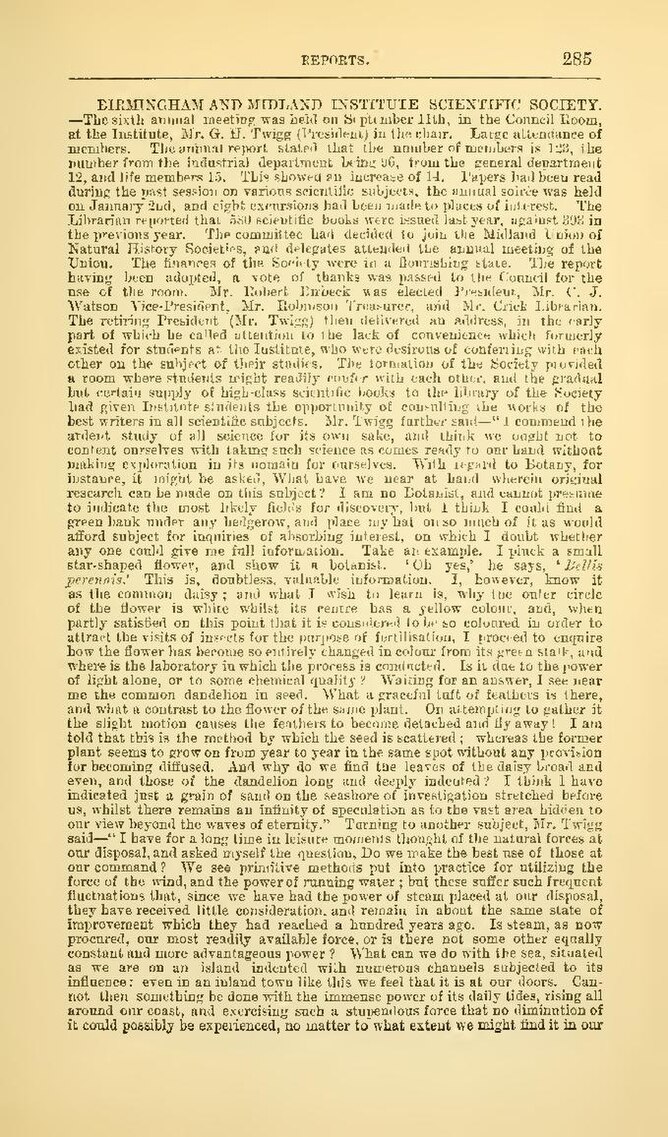Birmingham and Midland Institute Scientific Society.—The sixth annual meeting was held on September 11th, in the Council Room, at the Institute, Mr. G. H. Twigg (President) in the chair. Large attendance of members. The annual report stated that the number of members is 123, the number from the industrial department being 96, from the general department 12, and life members 15, This showed an increase of 14. Papers had been read during the past session on various scientific subjects, the annual soirée was held on January 2nd, and eight excursions had been wale to places of interest. The Librarian reported that 580 scientific books were issued last year, against 393 in the previous year. The committee had decided to join the Midland Union of Natural History Societies, and delegates attended the annual meeting of the Union. The finances of the Society were in a flourishing state. The report heaving been adapted, a vote of thanks was passed to the Council for the use of the room. Mr. Robert Birbeck was elected President, Mr. C. J. Watson Vice-President, Mr. Robinson Treasurer, and Mr. Crick Librarian. The retiring President (Mr. Twigg) then delivered an address, in the early part of which he called attention to the lack of convenience which formerly existed for students at the Institute, who were desirous of conferring with each other on the subject of their studies. The formation of the Society provided a room where students might readily confer with each other, and the gradual but certain supply of high-class scientific books to the Library of the Society had given Institute students the opportunity of consulting the works of the best writers in all scientific subjects. Mr. Twigg further said—"I commend the ardent study of all science for its own sake, and think we ought not to content ourselves with taking each science as comes ready to our hand without making exploration in its domain for ourselves. With regard to Botany, for instance, it might be asked, What have we near at hand wherein original research, can be made on this subject? I am no Botanist, and cannot presume to indicate the most likely fields for discovery, but I think I could find a green bank under any hedgerow, and place my hat on so much of it as would afford subject for inquiries of absorbing interest, on which I doubt whether any one could give me full information. Take an example. I pick a small star-shaped flower, and show it a botanist. 'Oh yes?' he says, 'Bellis perennis.' This is, doubtless, valuable information. I, however, know it as the common daisy; and what I wish to learn is, why the outer circle of the flower is white whilst its centre has a yellow colour, and, when partly satisfied on this point that it is considered to be so coloured in order to attract the visits of insects for the purpose of fertilisation, I proceed to enquire how the flower has become so entirely changed in colour from its green stalk, and where is the laboratory in which the process is conducted. Is it due to the power of light alone, or to some chemical quality? Waiting for an answer, I see near me the common dandelion in seed. What a graceful tuft of feathers is there, and what a contrast to the flower of the same plant. On attempting Lo gather it the slight motion causes the feathers to became detached and fly away! I am told that this is the method by which the seed is scattered; whereas the former plant seems to grow on from year to year in the same spot without any provision for becoming diffused, And why do we find the leaves of the daisy broad and even, and those of the dandelion long and deeply indented? I think I have indicated just a grain of sand on the seashore of investigation stretched before us, whilst there remains an infinity of speculation as to the vast area hidden to our view beyond the waves of eternity." Turning to another subject, Mr. Twigg said—"I have for a long time in leisure moments thought of the natural forces at our disposal, and asked myself the question, Do we make the best use of those at our command? We see primitive methods put into practice for utilizing the force of the wind, and the power of running water; but these suffer such frequent fluctuations that, since we have had the power of steam placed at our disposal, they have received little consideration. and remain in about the same state of improvement which they had reached a hundred years ago. Is steam, as now procured, our most readily available force, or is there not some other equally constant and more advantageous power? What can we do with the sea, situated as We are on an island indented with numerous channels subjected to its influence: even in an inland town like this we feel that it is at our doors, Cannot then something be done with the immense power of its daily tides, rising all around our coast, and exercising such a stupendous force that no diminution of it could possibly be experienced, no matter to what extent we might find it in our
